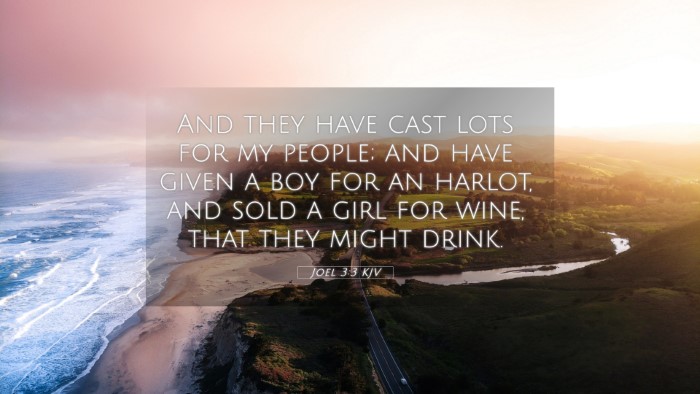Old Testament
Genesis Exodus Leviticus Numbers Deuteronomy Joshua Judges Ruth 1 Samuel 2 Samuel 1 Kings 2 Kings 1 Chronicles 2 Chronicles Ezra Nehemiah Esther Job Psalms Proverbs Ecclesiastes Song of Solomon Isaiah Jeremiah Lamentations Ezekiel Daniel Hosea Joel Amos Obadiah Jonah Micah Nahum Habakkuk Zephaniah Haggai Zechariah MalachiJoel 3:3 Similar Verses
Joel 3:3 Cross References
And they have cast lots for my people; and have given a boy for an harlot, and sold a girl for wine, that they might drink.
Uncover the Rich Themes and Topics of This Bible Verse
Listed below are the Bible themes associated with Joel 3:3. We invite you to explore each theme to gain deeper insights into the Scriptures.
Joel 3:3 Cross Reference Verses
This section features a detailed cross-reference designed to enrich your understanding of the Scriptures. Below, you will find carefully selected verses that echo the themes and teachings related to Joel 3:3 KJV. Click on any image to explore detailed analyses of related Bible verses and uncover deeper theological insights.
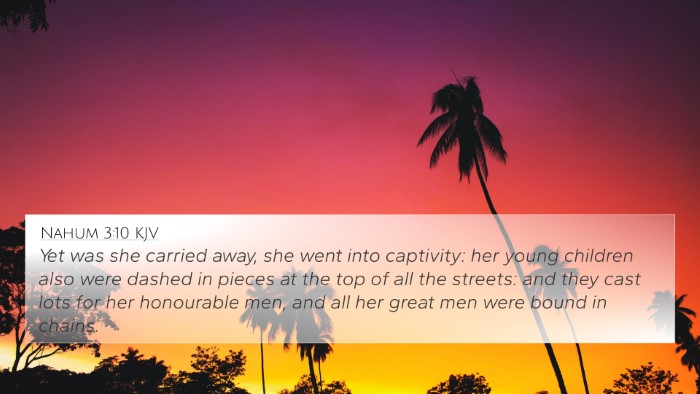
Nahum 3:10 (KJV) »
Yet was she carried away, she went into captivity: her young children also were dashed in pieces at the top of all the streets: and they cast lots for her honourable men, and all her great men were bound in chains.
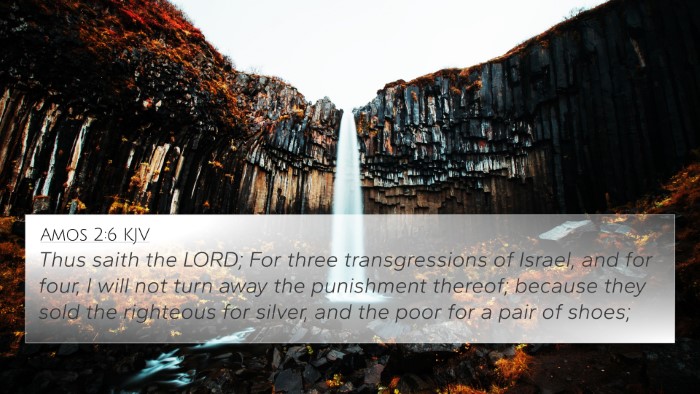
Amos 2:6 (KJV) »
Thus saith the LORD; For three transgressions of Israel, and for four, I will not turn away the punishment thereof; because they sold the righteous for silver, and the poor for a pair of shoes;
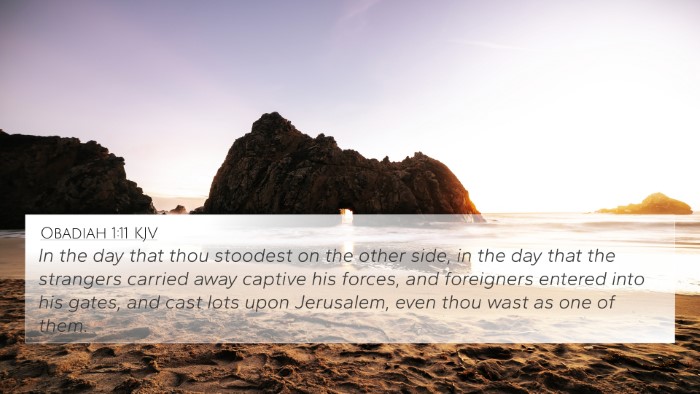
Obadiah 1:11 (KJV) »
In the day that thou stoodest on the other side, in the day that the strangers carried away captive his forces, and foreigners entered into his gates, and cast lots upon Jerusalem, even thou wast as one of them.
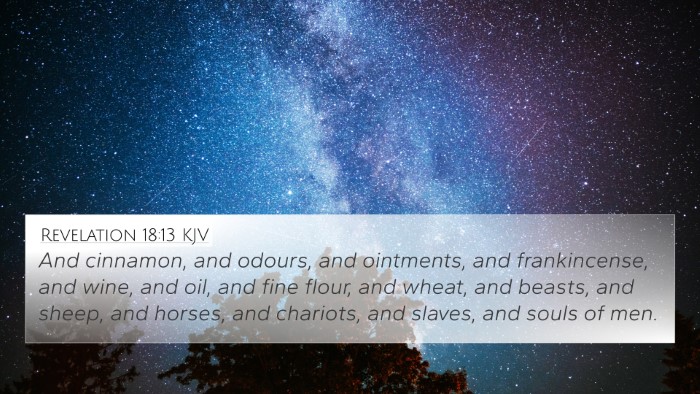
Revelation 18:13 (KJV) »
And cinnamon, and odours, and ointments, and frankincense, and wine, and oil, and fine flour, and wheat, and beasts, and sheep, and horses, and chariots, and slaves, and souls of men.
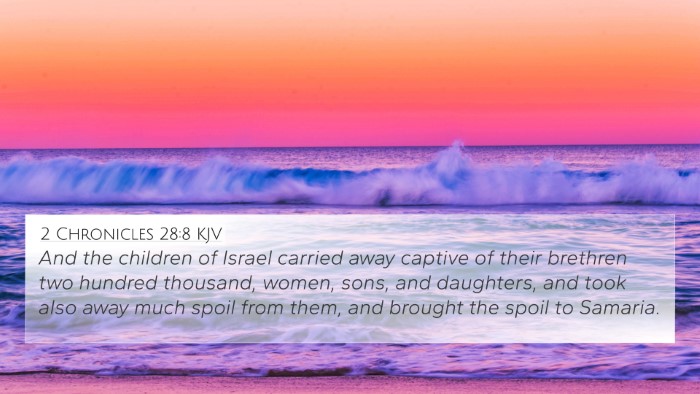
2 Chronicles 28:8 (KJV) »
And the children of Israel carried away captive of their brethren two hundred thousand, women, sons, and daughters, and took also away much spoil from them, and brought the spoil to Samaria.
Joel 3:3 Verse Analysis and Similar Verses
Understanding Joel 3:3
Joel 3:3 states, "And they have cast lots for my people; and have given a boy for an harlot, and sold a girl for wine, that they might drink." This verse depicts a grave moral degradation and exploitation of the vulnerable during tumultuous times in Israel's history. To grasp its meaning and significance, we can analyze it through insights drawn from various public domain commentaries.
Exegesis of Joel 3:3
This verse is a reflection of the injustices faced by the people of Israel, particularly during the invasions by foreign powers. The act of casting lots symbolizes the dehumanization of individuals, where people are treated as mere commodities.
Matthew Henry's Commentary
According to Matthew Henry, this verse highlights the dire consequences of sin and the exploitation that ensues in times of moral decay. His commentary emphasizes that such actions—casting lots for people and trading them for pleasure—point to the depths of depravity reached by both men and nations. Henry notes that this reflects God’s indignation against the oppression of His people.
Albert Barnes' Notes
Albert Barnes elaborates on the economic implications depicted in this verse. He elucidates that the trading of children and the use of boys for immoral purposes signify a complete breakdown of social order and personal integrity. Barnes points out that these actions are not merely sins against the individuals involved but are acts of rebellion against God, whose people were chosen and valued far beyond such treatment.
Adam Clarke's Commentary
Adam Clarke offers an additional layer of understanding by addressing the cultural context. He explains that the unfortunate practices of the time—including the trading of children—arose from desperation, leading to unethical decisions by those in dire poverty. Clarke insists that this verse captures the essence of societal collapse, showcasing how the societal sin has profound implications for the spiritual state of the nation.
Bible Cross-References
Joel 3:3 connects to several other biblical texts that address themes of injustice, exploitation, and the moral consequences of sin. Here are some relevant cross-references:
- Amos 2:6-7: Discusses the selling of the righteous for silver.
- Micah 3:1-3: Speaks against rulers who exploit their people.
- Lamentations 5:11: Addresses the suffering of women and children.
- Matthew 18:6: Warns about causing harm to the innocent.
- James 5:1-6: Condemns the oppressors and their unjust practices.
- Isaiah 1:17: Encourages the pursuit of justice for the oppressed.
- Zephaniah 3:3-5: Highlights those who are corrupt in their actions.
Thematic Connections
The moral and ethical teachings found in Joel 3:3 not only reflect the prophet's lament but also resonate with ongoing themes within the Bible regarding justice, care for the vulnerable, and the consequences of societal sin. Recognizing these connections can enhance one's understanding of scripture and reveal patterns of human behavior in the context of divine expectation.
How to Use Bible Cross-References
For a deeper exploration of biblical themes, one can utilize tools for cross-referencing, such as:
- Bible Concordance: Identify key terms for linked verses.
- Bible Cross-Reference Guide: Aids in discovering parallels across scriptures.
- Cross-Reference Bible Study: A method to study interconnected verses.
Conclusion
Joel 3:3 serves as a somber reminder of the societal failures that can occur when individuals and nations turn away from divine principles. Through comparative Bible verse analysis and thematic cross-referencing, believers can gain insights into God's enduring call for justice and righteousness. The implications of this verse echo through both the Old and New Testaments, urging readers to reflect on the treatment of the vulnerable and their responsibility in upholding justice.
In studying the scripture, one might ask, “What verses are related to Joel 3:3?” or seek to find “How do Joel 3:3 and Amos 2:6 connect?” Engaging with these questions not only fosters deeper understanding but also inspires action in alignment with biblical principles.

